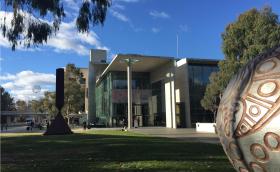Seven weeks have passed since Lionel Shriver delivered her ‘iconoclastic’ speech at the Brisbane Writers’ Festival. In it, she asserted that political correctness is antithetical to the creative process, because writers must be free to imagine stories outside their own experiences. I have been troubled by the ongoing debate, particularly because a lot of it has repeated Shriver’s condescending tone. So I will try to state my case without glib self-serving analogies, anecdotal evidence, obvious examples and absurd extrapolations.
Read: Shriver’s hot button speech on cultural appropriation
I believe that many in the mainstream majority have misunderstood Shriver’s critics. Anson Cameron claims that Maxine Beneba Clarke and Yassmin Abdel-Magied are “demanding the ghettoization of literature. Only the blind may write the blind, only the black may … you get the picture.” This “demand” comes not from the critics, but from Shriver’s speech. No one is actually saying that writers can only write from their own experiences. It is Shriver herself, and her defenders, who are re-framing ethical and social awareness as a restriction on what they may write. Abdel-Magied points out that Shriver does not discuss the nature of creativity, imagination and fiction. Rather, she asserts a blanket right to exploit marginalised identities, while denying – and mocking – the rights of those who are exploited to protest.
The issue is not that you, as a writer, must actually experience everything that you write about. The issue is with dominant narratives in which the perspective of privilege – usually white and male – becomes the only one that matters. Stories of disadvantage are then only ever imagined from a position of security. Other perspectives are dismissed, denied, and obliterated, which feeds a culture of ongoing inequity and disadvantage. To see it in operation, one need only look at Cameron’s challenge to his readers to read Shriver’s speech “and see if you get within cooee of [Beneba Clarke and Abdel Magied’s] holy rage.” This is how assured Cameron is not only that he is right, but that everyone else agrees with him. He dismisses Beneba Clarke and Abdel-Magied, and excludes them from a majority that thinks exactly the way he does. Their opinions, formed by direct experiences that Cameron does not share, are declared irrelevant, their voices are silenced. This is the essence of racism, identified by Abdel-Magied as “the attitude that lays the foundation for prejudice, for hate, for genocide.”
This attitude is now being challenged, and writers are being forced to think about how their work may be received by people who historically have never had much of a voice. Shriver wrote a book about a character who is morbidly obese, and many obese people refused to read it and campaigned against it. Political correctness didn’t affect Shriver’s right to create work – she wrote it anyway – but it did empower people to express their responses. Shriver may (rightly) feel that she wasn’t given a chance, that she really did have an empathetic story to tell. But she can’t dictate how anyone will receive her work. You don’t get to tell other people when they can or cannot feel offended, particularly if they have less social or economic power than you. Shriver dismisses people’s rights to express their feelings and challenges the validity of those feelings, while asserting her right to express herself as she chooses. She can’t have it both ways.
Shriver and Cameron go further, and ask how members of marginalised groups can tell mainstream writers they can’t write about them, while simultaneously demanding representation? I suggest that this apparent contradiction is another result of a misunderstanding. It’s not about what you may or may not write, but about writing with an awareness of social power hierarchies. Shriver’s critics are attacking her disrespectful attitude towards the representation of minorities in her work, which all too easily can be thoughtless, stereotypical or tokenistic. To eliminate minorities from a work altogether is not a solution, it’s another expression of mainstream dominance over difference. There is no simplistic answer, but if you approach your work with empathy, sensitivity, intelligence and curiosity, as Shriver claims to and I hope Cameron aspires to, then it is possible to avoid both stereotyping and whitewashing. You may find a way to address diversity in your work positively, rather than contribute to the ongoing culture of injustice and inequality.
I don’t believe this kind of ethical awareness need be paralysing. As authors, we all go through a process of generating material and then refining it. Any creative art form will involve a relationship between free-flow and choice. Nobody ever sees the first draft, because it’s probably full of lazy adjectives, ideas you haven’t thought through, and clichéd imagery. And maybe some unintentional bigotry. In the process of refining, you, with all your own personal blind spots and insights, flaws and strengths, prejudice and wisdom, are the sole arbiter. I suggest the forces of “political correctness” are an invitation to understand more fully a process that you’re already involved in. Your work comes from you and it will be an expression of your ideology, whether you’re aware of it or not.
Through fiction you can extend yourself wherever you would like to go, and wear as many hats as you like. But you will still be defined and limited by your own experiences. Shriver’s critics are asking for understanding of these limitations, awareness of the power hierarchies that affect them, and respect for the perspectives of others. Of course we can’t all be brilliant and not all writing is going to be good. But no writer ever sets out to write any less than the best they can. I invite you to put out the best version of yourself. We live in a world of inequality and injustice. You don’t have to be the whole solution, but you can choose not to be part of the problem. And if you do have to let out your inner lazy bigot, don’t be surprised if other people notice.






